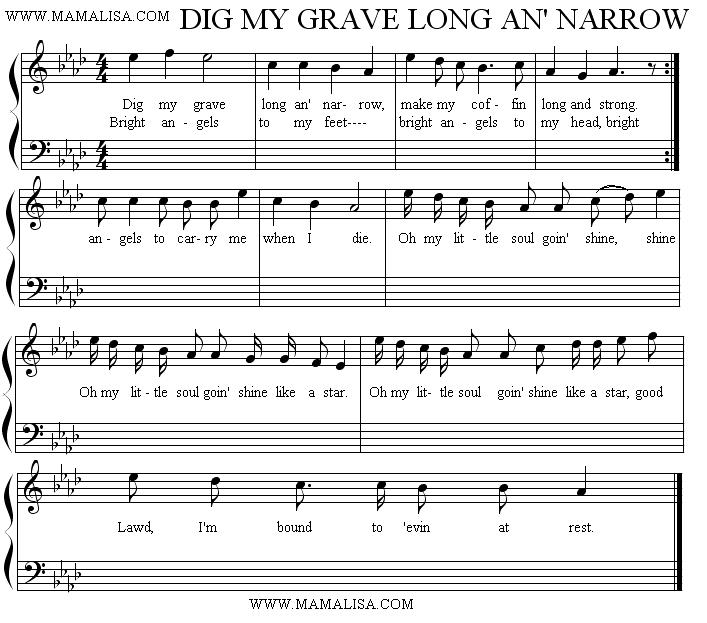Dig My Grave
This song was sung at funerals in the Bahamas.

Dig My Grave
Spiritual
Dig my grave long an' narrow,
Make my coffin long and strong,
Dig my grave long an' narrow,
Make my coffin long and strong.
Bright angels to my feet,
Bright angels to my head,
Bright angels to carry me when I die.
Oh! Mi little soul's goin' shine, shine,
Oh! Mi little soul goin' shine like a stahr,
Oh! Mi little soul goin' shine like a stahr,
Good Lawd, I'm bound for 'even at rest.*
Notes
*The standard English spelling of these lines: "Oh! Mi little soul goin' shine like a stahr, Good Lawd, I'm bound to 'even at rest..." is "Oh! My little soul going shine like a star, Good Lord, I'm bound to heaven at rest."
A 2nd Version called Go and Dig My Grave is sung in the US:
Go and dig my grave, both long and narrow;
Make my coffin light and strong,
Go and dig my grave, both long and narrow;
Make my coffin light and strong.
Well, it's two, two to my head,
It's two, two to my feet
It's two, two to carry me, Lord, when I die.
My soul's gonna shine like a star, like a star
My soul's gonna shine like a star, like a star
My soul's gonna shine like a star, like a star
My soul's gonna shine like a star, like a star
I'm bound for heaven when I die.
Comments
I found the following passage about this song in the book "Afro-American Folksongs: A Study in Racial and National Music" (1914) by Henry Edward Krehbiel. The quote is from a section of the book about Funeral Music:
"Relics of ancient ceremonies connected with death and burial have survived amongst the American negroes and have been influential in producing some strangely beautiful and impressive songs. One of these, 'Dig My Grave', from the Bahamas, where the songs, though they have much community of both poetical and musical phrase with them, yet show a higher development than do the slave songs of the States, is peculiarly impressive."


Thanks!
Thanks and Acknowledgements
The first version of this song can be found in "Bahama Songs and Stories: A Contribution to Folk-lore, Volume 3" (1895) by Charles Lincoln Edwards.


























